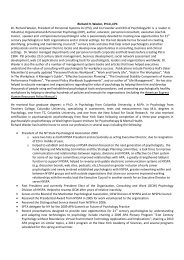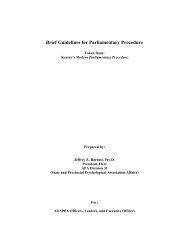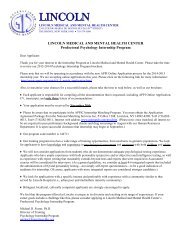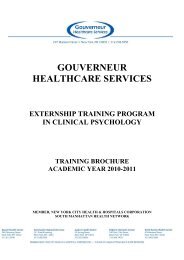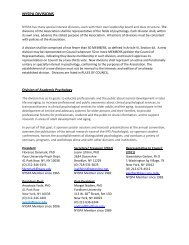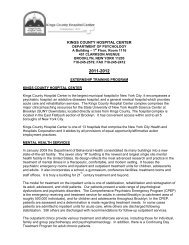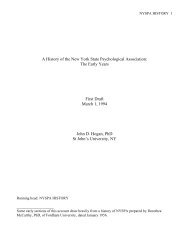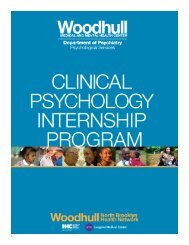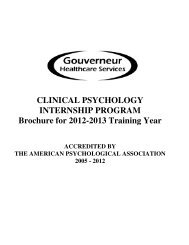2011 ⢠NYS Psychologist - New York State Psychological Association
2011 ⢠NYS Psychologist - New York State Psychological Association
2011 ⢠NYS Psychologist - New York State Psychological Association
Create successful ePaper yourself
Turn your PDF publications into a flip-book with our unique Google optimized e-Paper software.
seems that the validity scales is part of the appeal of the MMPI-2.<br />
Those scales can detect overly defensive or otherwise unreliable<br />
response sets. This is important because some of the participants<br />
can fake good meaning they want to minimize any emotional difficulties<br />
they may be experiencing in life.<br />
Who should be delay or deny bariatric surgery: According to<br />
(Walfish,Vance & Fabricatore, 2007), the most common reason<br />
they recommended to delay or deny the surgery was significant<br />
psychopathology (psychosis or bipolar disorder), untreated or<br />
undertreated depression, lack of understanding about the risks<br />
and postoperative requirements of the surgery, active eating disorder,<br />
and active substance abuse questionable ability to comply<br />
with a post-surgical regimen, chaotic lifestyle or significant situational<br />
stressors, unrealistic expectations about weight loss or<br />
postoperative life, unsupportive or conflictual family environment,<br />
and cognitive impairment (Walfish et al., 2007).<br />
Who should be considered for Bariatric surgery? a) a patient<br />
who has medical, physical or psychosocial problems associated<br />
with their obesity, b) a patient who have made prolonged but not<br />
successful efforts to relieve those problems by non-surgical<br />
means and c)when serious comorbidities between obesity and<br />
diabetes 2 mellitus , are present.<br />
Pre-Surgical <strong>Psychological</strong> Assessments of Bariatric Surgery:<br />
(American Society for Bariatric Surgery 2004), Eating Attitudes<br />
and Behaviors,<br />
Binge Eating Scale (BES), Binge Eating Questionnaire<br />
(BEQ), Three-Factor Eating Questionnaire (TFEQ), Eating Inventory<br />
(EI), Questionnaire on Eating and Weight Patterns-<br />
Revised (QEWP-R), Eating Disorder Examination-Questionnaire<br />
(EDE-Q), Eating Disorder Inventory - 2 (EDI-2), Eating Disorder<br />
Symptom Checklist (EDI-SC)<br />
Weight and Lifestyle inventory (WALI), Suggestions for Pre-<br />
Surgical <strong>Psychological</strong><br />
<strong>Psychological</strong> Assessments of Bariatric Surgery<br />
(Walfish,Vance & Fabricatore, 2007)<br />
Structured Clinical Interview for DSM-IV, Biosocial History,<br />
Eating Attitudes Test-Eating Disorders, Mental Status Exam, ,<br />
The Burns Anxiety Inventory,Personality And Psychopathology,<br />
Basic Personality Inventory (BPI), Personality Assessment Inventory<br />
(PAI), - Axis I, Clinical Version (SCID-I:CV), Beck Depression<br />
Inventory-II (BDI-II), Beck Anxiety Inventory<br />
(BAI), Minnesota Multiphasic Personality Inventory - 2 (MMPI-<br />
2), Millon Behavioral Medicine Diagnostic (MBMD), Rosenberg<br />
Self-Esteem Scale (SES)(RSE), Symptom Checklist 90 -R (SCL-<br />
90-R), Beck Depression Inventory (BDI), Eating Expectancy<br />
Questionnaire, Minnesota Multiphasic Personality Inventory-2<br />
(MMPI-2), Multidimensional Health Locus of Control (MHLC)<br />
Scales, Shipley Institute of Living Scale, Spielberger <strong>State</strong>-Trait<br />
Anger Expression Inventory (STAXI), Spielberger <strong>State</strong>-Trait Anxiety<br />
Inventory (STAI), and Weight and Lifestyle Inventory (WALI).<br />
Health Related Quality of Life Assessment (Walfish,Vance &<br />
Fabricatore, 2007).<br />
Quality of Life Questionnaire (QLQ), Quality of Life Inventory<br />
(QOLI), Impact of Weight on Quality of Life (IWQOL), Impact of<br />
Weight on Quality of Life (IWQOL-Lite), Impact of Weight on<br />
Quality of Life-Kids (IWQOL-Kids), OMS 36-item Short Form<br />
Health Survey (SF-36), Moorehead-Ardelt Quality of life Questionnaire<br />
(M-A QoLQ), Moorehead-Ardelt Quality of life Questionnaire<br />
II (M-A QoLQ II).<br />
After bariatric surgery measures: Bariatric Analysis and Reporting<br />
Outcome System (BAROS), Assessment Batteries,VA<br />
Bariatric Surgery Workgroup 2007,Alcohol Use Disorder Testcore<br />
(AUDIT-C), Drug Abuse Screening Test (DASTC), Millon<br />
Behavioral Medicine Diagnostic (MBMD), Multidimensional Health<br />
Locus of Control (MHLC), Questionnaire on Weight and Eating<br />
Patterns-Revised (QEWP-R).<br />
Conclusion<br />
In conclusion, obesity epidemic in the US and Worldwide has<br />
multifactorial causes and is linked to serious health consequences<br />
for women and men. The financial cost of obesity is about 100<br />
billion (CDC, 2006) and because of that cost the situation is urgent<br />
to take action. Health insurers should provide enhanced coverage<br />
for obesity prevention and treatment. <strong>Psychologist</strong>s,<br />
healthcare providers, educators, legislators, and social advocates<br />
should make a dedicated effort to deal with the urgent problem of<br />
obesity. Also, the weight loss industry must offer affordable programs<br />
for women and men who need to take care of their weight<br />
and general health.<br />
REFERENCE:<br />
Banks, E., Beral, V., Brown, A., Bull, D., Cameron, B., Crossley,B.,<br />
Deciacco, D., Ewart,D., Gerrard, L., Hall, J., Hall, S., Hilton, E., Ann<br />
Hogg, Keene, C., Langley,N., Langston, N., Reeves, G., Moya Simmonds,<br />
(1999) . M. The Million Women Study: design and characteristics<br />
of the study population.The Million Women Study Collaborative<br />
Group. University of Oxford, Oxford, UK. Breast Cancer Res, 1:73-<br />
80doi:10.1186/bcr16 The electronic version of this article is the complete<br />
one and can be found online at: http://breast-cancerresearch.com/content/1/1/73<br />
© 1999 Current Science Ltd.<br />
Coleman, D. (1979). Obesity genes: beneficial effects in heterozygous<br />
mice. Science 203, 663-665.<br />
Cristol, H.(2002). Trends in Global Obesity: developing nations are gaining<br />
on U.S. in a weighty matter.<br />
Donohoe, M. Medscape Ob/Gyn & Women's Health 2008<br />
www.medscape.com/viewarticle/566349 http://www.usa.gov/Citizen/<br />
Topics/<strong>New</strong>_Years_Resolutions.shtml Retrieved 7/30/<strong>2011</strong><br />
Center for Disease Control and prevention. (2006). Overweight and obesity:<br />
Defining overweight and obesity. http://www.cdc.gov/nccdphp/<br />
dnpa/obesity/defining.htm Retrieved 7/29/<strong>2011</strong><br />
Donohoe, Martin, MD, FACP Weighty Matters: Public Health Aspects of<br />
the Obesity Epidemic: Part II -- Treatments and Approaches to Combating<br />
the Problem Posted 01/04/2008 Department of Health and<br />
Human Services. www.womenshealth.gov<br />
Groop, L.(2000). Genetics of the metabolic syndrome. British Journal of<br />
Nutrition, 83, Suppl. 1, S39-S48<br />
http://journals.cambridge.org. Retrieved 8/2/<strong>2011</strong><br />
Grundy, S.M., Cannon, C.P., Klein, S., Pi-Sunyer, X.F., (2007). Managing<br />
obesity as a chronic disease: A Pathophysiologic approach to cardiometabolic<br />
risk reduction. Schimed retrieved from Medscape 2/20/08<br />
Mayer, L. E., Walsh, B.T., (1998) The use of selective serotonin reuptake<br />
inhibitors in eating disorders. J Clin Psychiatry, 59 suppl 15 28-34.<br />
Kulie, T., Slattengren, A., Redmer, J., Counts, H., Eglash, A., MD, and<br />
Schrager, S. (J Am Board Fam Med. <strong>2011</strong>;24(1):75-<br />
85. © <strong>2011</strong> American Board of Family Medicine, Retrieved from<br />
http://www.medscape.com/viewarticle/735689, Retrieved 7/30/<strong>2011</strong><br />
Lakka T, Laaksonen DE. Physical activity in prevention and treatment of<br />
the metabolic syndrome. Appl Physiol Nutr Metab. 2007;32(1):76-8 :<br />
17332786 www.ncbi.nih.gov/pubmed 177332786<br />
Jermendy, G., Littvay, L., Steinbach, R., Jermendy, A., Tarnoki, A., Tarnoki,<br />
D., Metneki and Osztovits, J. (<strong>2011</strong>). Heritability of the risk factors<br />
characteristic for the metabolic syndrome: a twin study.[Article in<br />
Hungarian] Fővárosi Bajcsy-Zsilinszky Kórház III. Belgyógyászati<br />
Osztály Budapest Maglódi út 89-91. 1106. http://<br />
www.ncbi.nlm.nih.gov/pubmed/21803723<br />
Grundy SM, Cleeman JI, Daniels SR, Donato KA, Eckel RH, Franklin BA,<br />
et al. American Heart <strong>Association</strong>; National Heart, Lung, and Blood<br />
Institute. Diagnosis and management of the metabolic syndrome: an<br />
American Heart <strong>Association</strong>/National Heart, Lung, and Blood Institute<br />
Page 7<br />
Vol. XXIII No. 2 • Fall <strong>2011</strong> • <strong>NYS</strong> <strong>Psychologist</strong>



